Photographs: Vivek Prakash/Reuters
The recent revelations about multi-billion scams perpetrated by India's top politicians and administrators have managed to jolt the nation's populace out of its usual apathy towards corruption.
Dr Subhash C Kashyap, former secretary-general of the Lok Sabha and a well-known expert on parliamentary affairs, has been involved in fighting corruption for years.
The former member of the National Commission to Review the Working of the Constitution speaks to Rediff.com's Claude Arpi about the root cause of the massive corruption permeating the Indian system and the need to find a solution.
How do you perceive the recent developments around the Lokpal Bill and the movement that Anna Hazare's hunger strike seems to have triggered in India?
The Lokpal Bill has a long history. Since the 1960s, the Lokpal Bill has been introduced in Parliament (with some minor modifications) not less than eight times, in one form or another. The basic idea [behind the Bill] has always been the same.
More than once, it has been referred to a Parliamentary Committee which deliberated upon the Bill before writing its report.
But personally, it seems to me, neither the Congress nor the BJP ever had the intention of passing the Bill; they had no intention of making it into a law.
It was just for public consumption and populist reasons. They would put it in their election manifesto, but the strategy would remain to refer it to a committee or send the committee members on tour or keep granting extensions to the committee. (All these steps were taken) with the clear intention of not passing the Bill. As a result, though the Bill was introduced eight times, it was never passed.
'Lokpal bill does not provide a remedy against corruption'
Image: Former telecom minister A Raja and former CWG OC chairman Suresh KalmadiPhotographs: Reuters
You were secretary general of the 7th, 8th and 9th Lok Sabha. Was the Lokpal Bill introduced in the House during these years?
Yes, it was. So I can speak from first-hand experience. That is why I came to this conclusion or rather I was told that the government had no intention of passing the Bill, therefore more and more extensions had to be granted to the committee or [sometimes] they were sent on Bharat darshan tour and so forth.
Recently, there has been public pressure to pass the Bill and, as you know, this time the situation has been more acute. Some social activists enlisted the support of Anna Hazare and a sort of movement was created under his leadership. All this, including his fast unto death, is in the public domain and has been widely reported.
How do you explain this movement? What made it different this time?
It is difficult to say; (the answer) would be a matter of opinion or the result of an investigation. How this movement started, what was the extent of the movement and how did it prosper?
There are various versions. Since I am not in a position to investigate and verify the facts, it would not be proper for me to answer.
One version says that it was largely a media creation, more by the electronic media than the print media.
How did it happen? How was it won over? Here again there are different views. Perhaps the electronic media was as public-spirited as Anna Hazare and others? The second version was that it was a spontaneous popular movement. I do not have statistics. How many people participated in different parts of the country?
According to some sources, the total number would not be very large for a country of India's size. To say that it was a popular uprising or a JP-like movement or something like the recent protests in Tunisia or Egypt, we would have to find out what was the total number of people involved all over India, how many participated. If it is only a question of a few thousand who carried candles or shouted slogans, it is not much for a country like India. But it is true that when the movement started, the media created a tremendous euphoria, even sometimes hysteria.
Making the government react in panic!
Yes, a panic reaction. It was mainly because the electronic media, which has become very powerful today, played it up.
This is not to deny the merits of the issue: corruption has become a matter of deep concern; corruption has to be fought; it is at the root of many of our problems today. Successive governments have cheated the people with the Lokpal Bill; they never had the intention of passing it; it should have been passed long ago.
But as far as this political movement is concerned, there are other views: whom did it benefit? It had largely the effect of diverting public attention from various scandals and scams towards the Lokpal Bill and Anna Hazare civil movement?
(In the process, 2G scam accused former telecom minister A) Raja, (Commonwealth Games scam accused Congress leader Suresh) Kalmadi and others were forgotten.
In a way, the media's attention was shifted to the Lokpal Bill, which is not the same thing as to fighting corruption.
Whichever draft you adopt, it is only a curative measure. The Lokpal Bill is for dealing with persons accused of corruption. It does not strike at the root cause of corruption. It does not provide a remedy against corruption; it is only intended for punishing those who have been found to be corrupt.
'Electoral system is the root cause of corruption'
Image: Voters wait to cast their votes at a polling boothPhotographs: PIB Photos
And usually escape the net of justice?
The Lokpal Bill should be framed in such a way, that those (who managed) to escape the net now, should be framed and suitably punished. But it is not the same thing as analysing the phenomenon of corruption and providing remedies to treat this cancer.
During the just-conducted elections in Tamil Nadu, the Election Commission confiscated nearly Rs 50 crore in cash. Still, on election day, envelopes were reportedly distributed to voters. Will the Lokpal Bill take care of this?
No, the Lokpal Bill does not take care of this. It has to be handled under the election law.
Why is there corruption in the first place?
If you go down to the fundamentals, the root cause of corruption is the crisis of character and the devaluation of values. We don't believe any more in values such as honesty, integrity, forthrightness and so on.
The present day values are money, power and success; success at any cost. One is prepared to make any compromise with morals and values to become a success story.
Because there is no punishment?
Yes!
One has no respect for higher values and (at the same time) one is willing to commit any wrong to become a success story. Books are written on 'how to become successful'. Business houses have departments dealing with how to maximise profits and then you have lobbyists!
(The motto is) to become rich at any cost and wield maximum power, to come and stay in power by any means. If you have to buy MPs, (there is) no compunction, you just do it. There is no shame even if you have to indulge in immoral acts. Only 'failure' is inexcusable, you have to succeed.
This is one thing: if money is the supreme asset and power comes from spending money, then corruption will be [certainly] there.
Secondly, the single important cause of corruption, particularly political corruption, is the electoral system. It is the root cause of corruption in politics.
Today, you need tonnes of money to carry out any political activity. To conduct a campaign, to win an election, you need money.
Even to organise a political meeting, you need a lot of money. Where does this come from? Nobody gives his hard-earned white money for organising a meeting. Most of the money comes from crime; you have therefore a criminalisation of politics and a politicisation of crime.
As a result, you have people with criminal background in politics. It is said that the Lok Sabha has 175 members with criminal backgrounds and the situation in the state assemblies is much worse.
Their reasoning for including those who have money and muscle power is that if it is their money and muscle power which elects members, why should they elect someone else?
Before they used to pay 'protection money' to politicians, now they have realised if they are elected, they can 'protect' themselves. The problem of criminalisation of politics then starts. One of the most important reasons for black economy is also the need for black money at the time of elections. You need back money to pay the politicians to get some job done, you need black money for election campaigns; therefore black money has to be generated.
If one single cause of corruption was to be located, I would say it is the present electoral system.
'People won't be elected by their castes'
Image: Voters wait to cast their votes at a polling boothPhotographs: Arko Datta/Reuters
How do you change this situation?
We have been working on it. We have held important meetings of various groups. With the Rashtriya Jagriti Sansthan, we have had several discussions and [we worked] on a campaign for good governance. We have concluded that it is the electoral reforms which should have an over-riding priority.
Several aspects have to be taken care of. One is the representational legitimacy of the elected representatives. Today, their representation is in doubt; they can't even be called representatives because the majority of those who are elected have more votes cast against them rather than for them. They get elected because of the FPTP (First Past The Post) electoral system. Often a majority has voted against them.
Are you suggesting two rounds of voting?
Yes, we suggest a run-off between the first two candidates in case no one gets a clear majority in the first round. It will have several results:
Right now, a person having a vote share of 15 per cent can according to all statistics be 90 per cent sure to win the elections. With a vote share of 15 per cent, you are 90 per cent sure to win! If there is a second round (you will need 50 per cent majority), you can't depend on your vote share alone. As far as the Lok Sabha is concerned, there is NOT a single constituency all over the country where one single caste has a majority. A caste may comprise 15 per cent or 20 per cent of a constituency, but it doesn't have a majority. Even in Scheduled Castes or Scheduled Tribes constituencies, these communities don't have a majority.
Also Scheduled Caste is not a caste. It is a category under which many castes are included. Any caste included in the Schedule becomes a SC. In fact, as far as the Constitution is concerned, it does not use the word 'caste', except for the purpose of 'non-discrimination on the ground of caste'. The word 'caste' has been used only in articles 15 and 16 for 'non-discrimination on the ground of caste'. Everywhere else, the word 'castes' comes in plural along with 'scheduled' for the purpose of preferential treatment, etc.
For elections, if you need 50 per cent majority, people won't be elected by their castes only, the politicisation of caste will therefore be reduced.
It would be more difficult to be elected on goonda support because it is more difficult to 'influence' 50 per cent of the electors. Today, the money and muscle power is able to influence 15 per cent or 17 percent of the voters; it would not be so easy to 'buy' more than 50 per cent.
The cost of elections should be drastically reduced by law.
'The number of parties has to be reduced'
Image: Women participate in a political rallyPhotographs: Reuben NV
How can we implement this?
For example, you can ban [private] campaigning by candidates. The State could arrange meetings where all candidates get an opportunity to speak; the period of campaigning can be reduced; the State can provide time slots on TV, radio and other government channels; the State can provide CDs which can be used by the candidates; the State can provide posters (common posters with parties' manifesto or individual posters).
This means no State funding in cash, only in kind.
Then you could reduce the number of candidates by providing registration and deregistration of parties under a law: today registration is only for political symbols. We need a law for the registration of parties where the internal democracy [of the party] is taken care of, accounts are maintained, incomes and expenditures of the parties are accounted for and audited and these accounts are made available for public scrutiny.
Today, you have nearly 1,200 parties registered with the EC which participate in elections. The number of parties has to be reduced by law, it can be done if you make a proposition according to which, for being recognised as a 'national party', a party should have at least 5 per cent of the votes in at least half of the states of India.
It is not asking for too much. A national party contesting the LS elections in the entire country should be present in at least 50 per cent of the states with 5 per cent of the vote share. If this is adopted, you will have only two or three national parties.
The regional parties should have at least 5 per cent votes in a state where they want to be recognised as a state party and they can contest the assembly elections and elections to the Rajya Sabha.
It would restrict the State funding (in cash or kind). This has to be linked with other electoral laws; for all this an integrated approach has to be taken.
'Government should have taken our recommendations more seriously'
Image: Workers participate in the NREGA schemeIn 2000, you were a member of the National Commission to Review the Working of the Constitution appointed to make suitable recommendations to amend the Constitution. Ten years later, what is the percentage of recommendations that have been implemented?
I think the government should have taken it more seriously and considered all the recommendations. It should have come up with a report clearly stating which recommendation has been accepted or which one has not been accepted.
This was not done. There is no Action Taken Report.
However, a number of important recommendations have been given effect if not fully, at least partially. I can name some of them:
- Right to Information, though the demand for it predates the Commission, we however recommended the RTI and later it became a law.
- Right to Education which is now a fact
- Limiting the size of the Cabinet: We recommended that it should not have more than 10 per cent of the total members of the Lower House. The government made it 15 per cent, but it was accepted. The Constitution has been suitably amended and today the prime minister or the chief ministers are not at liberty to appoint any number of ministers.
- We had said that defectors, whether singly or in groups, should be disqualified. Earlier, the provision was that if you can claim a split or a merger, you can escape disqualification. It has been 'half' accepted. Now a split cannot be a ground for escaping disqualification. The Constitution has been amended [accordingly]. Merger has unfortunately not been taken into consideration by the government.
- NREGA: Although the credit for the minimum days Rural Employment Guarantee Scheme is now given to political leadership, the scheme was suggested by the Commission.
- Some 20 important recommendations have been accepted. Either laws have been passed or the Constitution amended.
'We are the richest country in the world!'
When one looks at 2010 or the beginning of 2011, one has never seen so much corruption emerging. Is it a good sign or a bad sign?
It is both. It is bad because never before in this country and the entire world, have so many scandals of such magnitude come to light within such a short time. But the fact that they have come to light, have been discussed and people are aware is a good sign.
The fact that we can discuss it freely shows that we have freedom of speech; therefore we can hope to come out of this problem stronger. I am very optimistic in the long run.
What is the 'long run'?
Ten, 20 years, it can be anything, it is difficult to say. Political astrology is a risky business. It is difficult to predict, it depends on how things take shape. But on principle, I am hopeful that the country will emerge stronger and better. In the immediate present, things are bleak.
Do you still think that the Indian system is better than the Chinese one?
Definitively. Definitively.
Even if it seems less efficient.
It is much better. We can discuss, we can argue, we can change things; it is the strength of our system.
And Raja is in jail!
I wish many more would also be [in jail]. Hopefully one day the properties of the corrupt persons will be confiscated.
I wish that the Indian money stashed abroad could have been brought back to the country. Some of us (former top cop KPS Gill, lawyer Ram Jethmalani, myself and others) have petitioned the Supreme Court to bring back this money. Hearings are going on. There is so much Indian money abroad. According to Swiss banks, no other country in the world has deposited so much money.
We are the richest country in the world!
According to some calculations, if this money comes back to India and it is distributed to all the citizens, there will be no poor people left in the country. Or the government can declare the country tax-free for 30 or 40 years. There will be enough money to take care of all government expenses at the present rate of expenditure. And all this money is illegal money!
The fact that we are fighting for all this is a healthy sign, a hopeful sign.

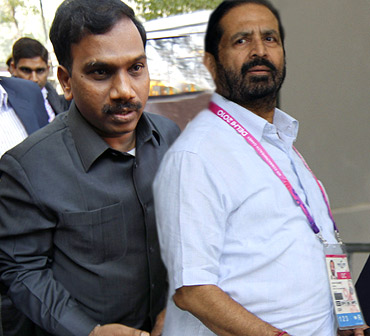
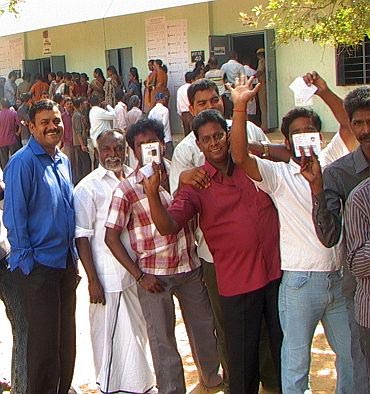
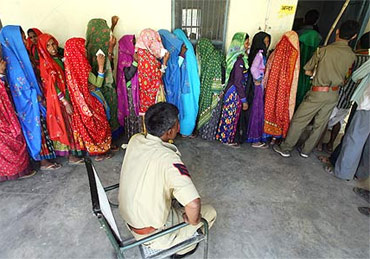
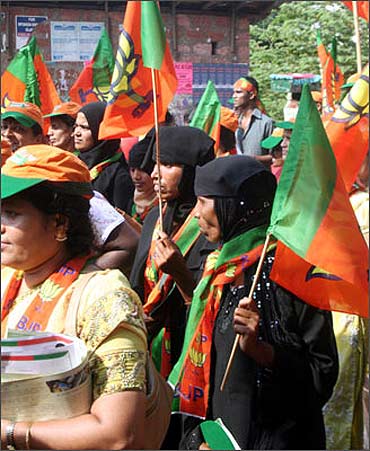
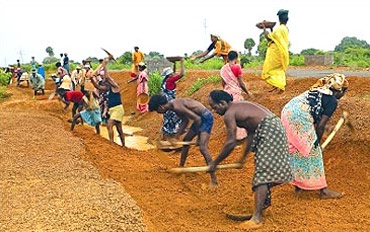
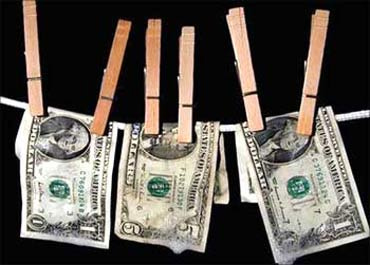
article